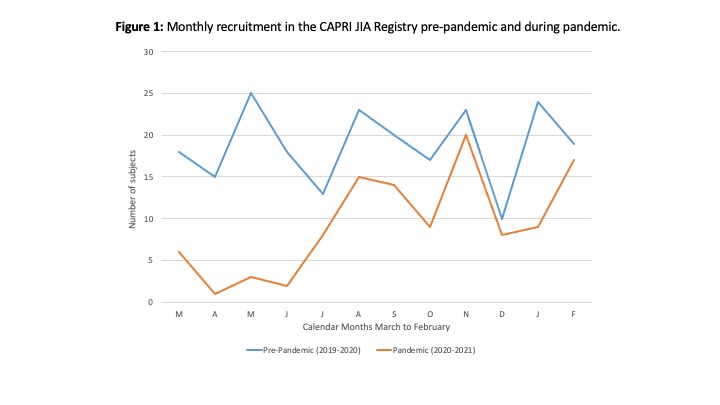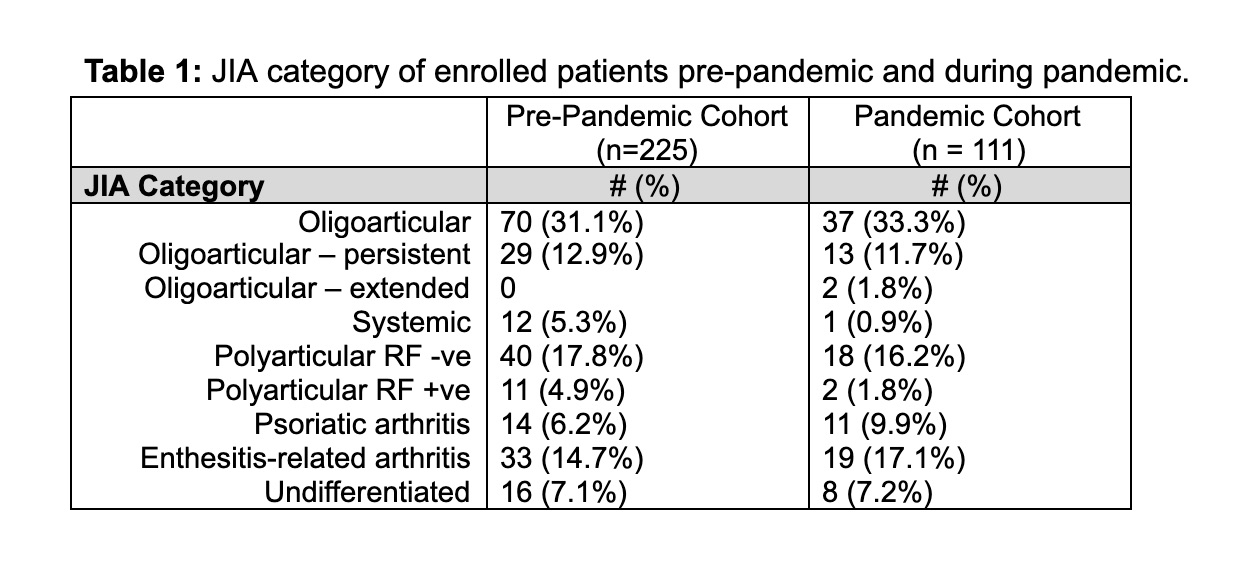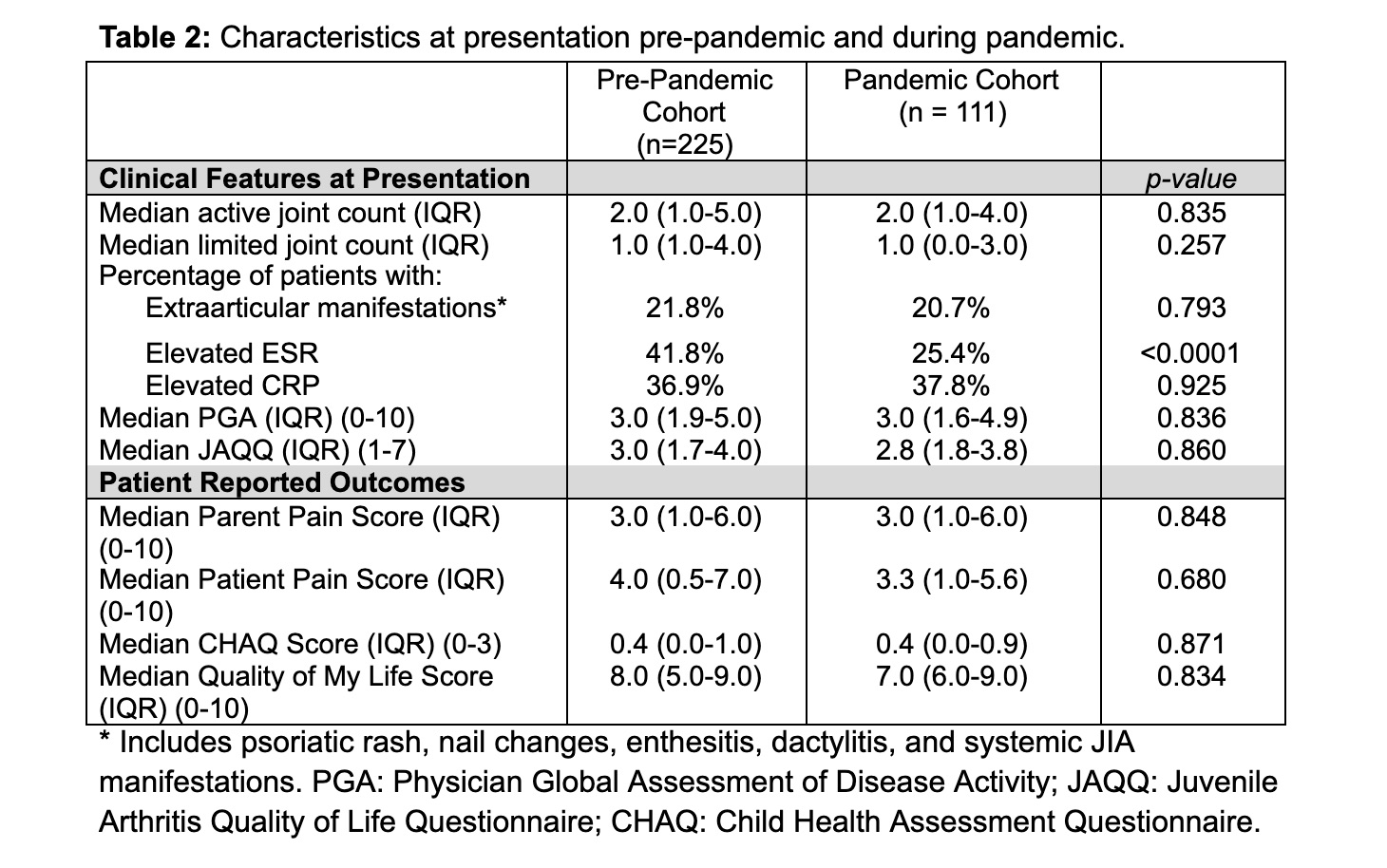Session Information
Date: Tuesday, November 9, 2021
Title: Pediatric Rheumatology – Clinical Poster III: Miscellaneous Rheumatic Disease (1614–1644)
Session Type: Poster Session D
Session Time: 8:30AM-10:30AM
Background/Purpose: The COVID-19 pandemic has disrupted the delivery of routine healthcare and clinical research around the world. Several reports have shown an impact on rheumatology care. The U.K. reported that rheumatologists were averaging a 50% reduction in clinic function during the first six months of the pandemic. Higher rates of JIA disease flares presenting to hospital during the pandemic were reported by our Italian colleagues, perhaps due to delayed follow-up intervals. The aim of this study was to characterize COVID-related disruptions in JIA research and initial presentation of JIA to pediatric rheumatology (PR) care in Canada. We hypothesize that research disruption would be mostly reflected by a drop in study recruitment, while disruption of care would result in prolongation of time from symptom onset to first assessment and a greater severity at presentation.
Methods: Data was collected by the Canadian Alliance of Pediatric Rheumatology Investigators (CAPRI) National JIA Registry, a registry of children newly diagnosed with JIA that collects and shares longitudinal data on disease course, outcomes and adverse events. Data from the year pre-pandemic (March 11, 2019-March 10, 2020) was compared to data from the pandemic year (March 11, 2020-March 10, 2021). The number of patients enrolled in the Registry during the two periods was determined. To assess the pandemic’s impact, we compared time from symptom onset to first PR appointment, disease activity at presentation, and parent/patient reported well-being at presentation. Descriptive analysis of the data was performed. Proportions were compared with chi square tests and medians with Mann-Whitney tests.
Results: A total of 225 patients were enrolled in the pre-pandemic year, and 111 in the pandemic year. Registry enrollment was notably decreased during the months of March to June 2020, at the start of the global pandemic (Figure 1). The median time from symptom onset to first assessment was 138 days (IQR 64-365 days) in the pre-pandemic year, and 146 days (IQR 83-359 days) in the pandemic year. The JIA categories of patients enrolled remained stable; predominantly oligoarthritis (44% pre-pandemic, 46.8% pandemic) with the next most common being enthesitis-related arthritis and RF-negative polyarthritis in both cohorts (Table 1). Clinical features and patient reported measures were very similar between the two cohorts. The Physician Global Assessment (PGA) of Disease Activity Score and Juvenile Arthritis Quality of Life Questionnaire (JAQQ) were virtually identical (Table 2).
Conclusion: The CAPRI National Registry has allowed us to describe the impact of the global COVID-19 pandemic on JIA presentation to PR care. Research disruption was associated with a 50% enrollment decrease in the pandemic year, most significantly from March to June 2020. It has since improved, consistent with a limit in non-essential research staff presence in hospitals early on. We did not observe the hypothesized delay in presentation and increased severity at presentation. This suggests that within Canada, PR care has adapted well to provide ongoing support and care to new patient consults and avoided significant negative impacts.
Submitted on behalf of the CAPRI Registry Investigators.
To cite this abstract in AMA style:
Dushnicky M, Campbell C, Beattie K, Berard R, Cellucci T, Chan M, Gerschman T, Houghton K, Johnson N, LeBlanc C, Lim L, Luca N, Miettunen P, Morishita K, Proulx-Gauthier J, Rumsey D, Schmeling H, Scuccimarri R, Tam H, Guzman J, Batthish M. Impact of the COVID-19 Pandemic on Presentation of JIA to Pediatric Rheumatology Care in Canada [abstract]. Arthritis Rheumatol. 2021; 73 (suppl 9). https://acrabstracts.org/abstract/impact-of-the-covid-19-pandemic-on-presentation-of-jia-to-pediatric-rheumatology-care-in-canada/. Accessed .« Back to ACR Convergence 2021
ACR Meeting Abstracts - https://acrabstracts.org/abstract/impact-of-the-covid-19-pandemic-on-presentation-of-jia-to-pediatric-rheumatology-care-in-canada/



